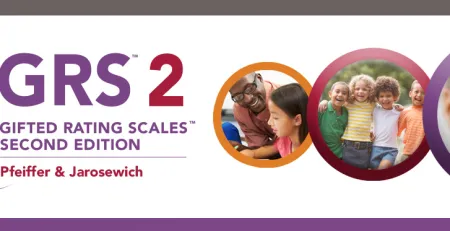Must have assessments for school psychologists evaluating ADHD
Assessing ADHD can feel like a monumental task. But when mental health practitioners responsible for the assessment, monitoring, and treatment of ADHD have the right tools and resources, they can make better data-based decisions that lead to better outcomes for the individual being assessed.
Why is ADHD so challenging to address?
ADHD is complex and is highly comorbid with other conditions such as anxiety, depression, and sleep problems. Symptoms of ADHD are also very similar to the symptoms of other disorders such as bipolar disorder and substance use and abuse. Environmental factors such as family turmoil and domestic abuse in the household can also impact a student’s behavior resulting in symptoms that appear to mimic ADHD. Lastly, but not exhaustively, there are cases of students feigning symptoms of ADHD for secondary gains such as extra time on tests and additional classroom support.
Due to the complexity of ADHD, it’s important that practitioners get as complete a picture as possible of the person they are assessing. Practitioners should not only choose assessments that assess the area of suspected disability based on observations and interviews, but they should also choose broadband assessments or more focused assessments that also look at comorbid conditions and related disabilities.
Assessing ADHD in students
MHS has been committed to being a leader in the assessment of ADHD for decades and has curated a solid portfolio of assessment tools for practitioners. Although not an exhaustive list, here are a few that our customers use as their go-to assessment solutions for ADHD and attention related concerns.
Conners Comprehensive Behavior Rating Scales™ (Conners CBRS®): The Conners CBRS is designed to provide a complete overview of child and adolescent concerns and disorders. It is a multi-informant assessment of children and youth aged 6 to 18 years of age. With nine Content Scales and 13 DSM-5 Scales, the clinical comprehensiveness of the Conners CBRS is invaluable when it comes to the differential diagnosis of ADHD and common co-occurring disorders and symptoms. For an initial assessment, the Conners CBRS is a must if getting a complete picture of a child’s social, emotional, and behavioral functioning is important.
Conners 3rd Edition®(Conners 3™) and the upcoming Conners 4th Edition (Conners 4®): More focused than the Conners CBRS, the Conners 3 is a thorough assessment of ADHD and its most common comorbid problems and disorders in children and youth aged 6-18 years of age. It is multi-informant and considers home, school, and social settings. Although the Conners 3 has been a Gold Standard and trusted assessment tool of ADHD for the past 13 years, its critical that assessment developers continue to listen to the research and users and reflect necessary changes in their solutions as well as update the normative samples to ensure reliable and valid results. MHS has done just that and will be releasing the Conners 4 later this year. The Conners 4 will bring several valuable updates to practitioners that will better assist with differential diagnosis and treatment. One of the most exciting updates is related to the connection of ADHD and sleep.
The connection between ADHD and sleep and sleep problems is well established. An estimated 25-50% of people with ADHD experience some type of sleep problem which negatively impacts daily life in terms work and school responsibilities as well as family, friends, and work-place relationships. It’s important for practitioners to differentiate a sleep problem from ADHD so that proper treatment can be provided. Given the importance of assessing sleep, MHS will be providing free access to the PROMIS Sleep measures to all users of the Conners 4 on the MHS Online Assessment Center+ (MAC+). The PROMIS Sleep measures assess Sleep Disturbance and Sleep Related Impairment. They are short, take only five minutes to complete, and will be integrated into the MAC+ report.
Comprehensive Executive Function Inventory™ (CEFI®): The CEFI is a comprehensive behavior rating scale of executive function strengths and weaknesses in children and youth aged 5 to 18 years of age. Executive function is important for problem solving and reasoning, and difficulties with executive function can often make simple tasks challenging. Assessing executive functioning is a critical part of an ADHD assessment battery in order to best serve the child. MHS’ customers use the CEFI because its comprehensive, focuses on strengths, and includes a detailed report that provides intervention strategies for teachers and parents based on the item responses.
Conners Continuous Performance Test 3rd Edition™ (Conners CPT 3™): The Conners CPT 3 is an invaluable addition to any assessment of ADHD. Although not specific to ADHD, the Conners CPT 3 is a task-oriented computerized assessment of attention related problems in individuals aged 8 years and older. The Conners CPT 3 provides objective information about an individual’s performance across four dimensions of attention: inattentiveness, impulsivity, sustained attention, and vigilance.
Although there can be challenges and roadblocks to utilizing multiple measures in an assessment battery, such as time to administer and score additional measures, the funds to purchase needed assessments, and the willingness of the student to sit for longer periods of time, the benefits of getting a complete picture far outweigh these concerns and will make the world of a difference for the student being assessed.
Get in touch with us for more information on MHS’ commitment to the field of ADHD.
Disclaimer: Although assessments can provide practitioners with valuable information to guide data-based decision making and treatment, assessments do not diagnose and should not be used in isolation.










